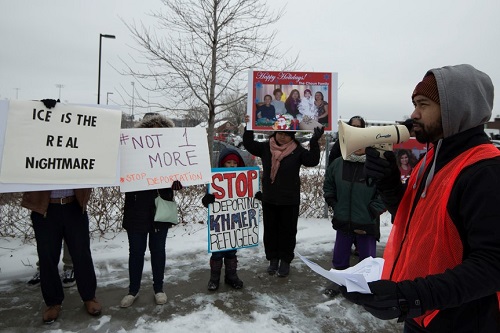fibonacci blue photo
By
Bunkong Tuon
Happy Christmas 2018
Beautiful Mariah Carey sings
her cute, happy Christmas songs.
Women run from store to store
shopping bags in hands.
Husbands and boyfriends check
their smart phones, light
illuminating their red-brown stubbles,
reading the latest sports news.
And the news is happily miles away
somewhere in El Paso, Texas,
a plane on the hot tarmac
taxiing into Gate 22F
where thirty-six
Cambodian Americans
are waiting to be deported
to a country they never knew
but only felt in the trembling fists
of fathers, the weeping eyes
of mothers, where an uncle
was killed by the Khmer Rouge,
an older sister died from starvation.
They knew even less
about the refugee camps
where they were born,
something about fences,
Thai military police,
a life of dust and wind.
What they’ve known
is Long Beach, Fresno,
San Francisco, Boston,
New York City, St. Cloud,
Detroit, Dallas, Church Falls.
Their friends are black, white,
Mexican, other Asians.
They committed their crimes
a lifetime ago, did their time.
Freed, they got married,
had kids, settled down,
minded their own business when
ICE agents came into their businesses,
brought them to detention centers,
no questions answered.
Everything they did to rebuild
their lives crumble.
And what the government replaces
that with is the wall,
icing forgiveness, God’s grace.
Surrounded by agents, these Americans
of Cambodian descent board the plane,
not knowing when they will see again
their pregnant wives, their weeping parents,
and fearing for the worst:
their children growing up fatherless,
falling into gangs, a life of violence,
making the same stupid mistakes.
Bunkong Tuon
Bunkong Tuon is the author of Gruel (NYQ Books, 2015), And So I Was Blessed (NYQ Books, 2017), and Dead Tongue (with Joanna C. Valente, forthcoming from Yes Poetry), as well as a contributor to Cultural Weekly. He’s working on a book of poems about raising his daughter in Trump America. He is an associate professor of English and Asian Studies at Union College.



This is an outrage and makes me weep. Thank you for bringing it to light. I do not recognize this America. The America I know welcomed the refugees, we helped clean up the mess that war created, a war where we were partners in crime. It wasn't just nice of us--it was an obligation to help heal the wounds that were the outcome of this war. The refugees we lived with were not whole, healthy people but broken, hurt but beautiful. Christ tells us he came not for the well, but for the wounded. Are we to help only when those coming are perfect? That would be so un-Christ-like. Do we stop helping when it hurts us? NO!! Lord have mercy on the hard hearted. We have much work to do to fight this.